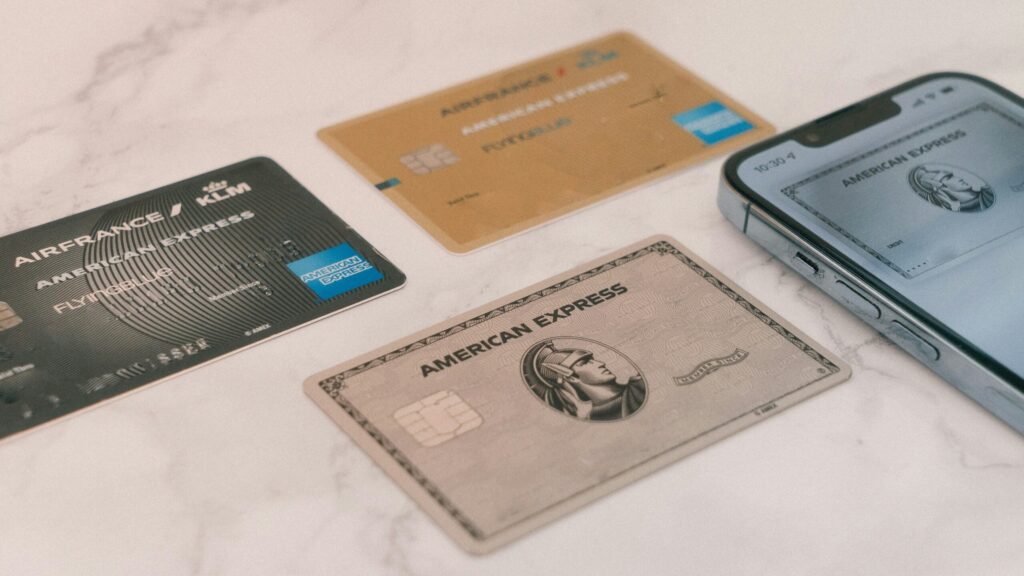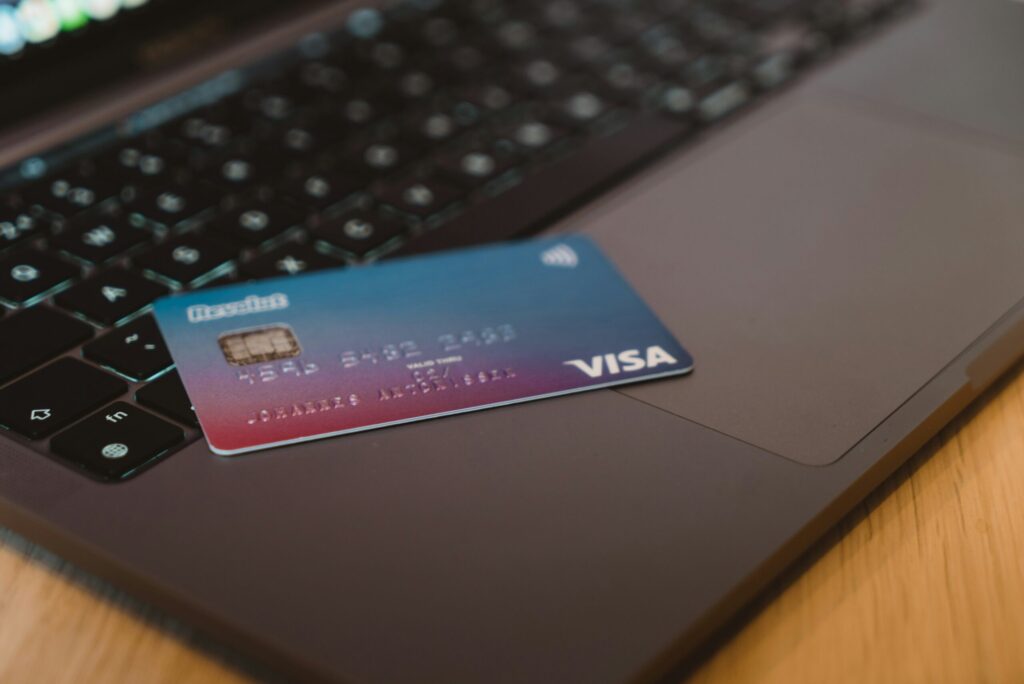Credit cards for digital nomads are a big topic within the community. Many digital nomads try to save on flights and get all kind of other benefits by using the right credit card.
In this article, we’ll have a closer look at the actual advantages but also the pitfalls of using a credit card as a digital nomad. Moreover, we’ll have a closer look at some good options depending on your goals.
We will also focus on credit cards available to European citizens/residents as these often struggle to find appropriate options.
What a Digital Nomad Should Look For in a Credit Card
There are many reasons what a digital nomad should look for when getting a credit card:
- Miles: most digital nomads would want to use credit cards to save miles or points. Then can redeem these while booking a flight or you can use them to get an upgrade. Yet, in many cases you can also use them for other purposes (e.g. hotel bookings).
- Lounge access: some credit cards for digital nomads will also give you access to airport lounges. A must-have for nomads who travel the whole time and spend a good amount of time in airports.
- Insurance: credit cards for digital nomads can also offer insurance in case you rent a car or make specific purchases (e.g. hardware) with the card.
- Fraud protection: when traveling around the globe, sooner or later you might fall prey to some fraudsters trying to misuse your card details. Most credit cards will offer a good protection and insurance against fraudulent transactions.
- Expense management: if you use one and the same credit card cross countries it will become easier for you to track your expenses and get a grasp of your finances.
- Other benefits: credit cards can offer miscellaneous perks like free dining a few times a year or free subscriptions to services they affiliate with.

Top Credit Cards for Digital Nomads
Now that you now why you should get a credit card for digital nomads and what features are important we can have a closer look at some actual examples.
Best Premium Travel Credit Cards for Digital Nomads
Hereby a list of the best credit cards for digital nomads which offer premium travel advantages.
These cards might come at a steeper annual cost but they might be worth it for the benefits they have to offer:
Best No Foreign Transaction Fee Cards
The following are the best credit cards for digital nomads that don’t charge any foreign transaction fees:
Best No Annual Fee Credit Cards
Let’s now have a look at some interesting credit cards which don’t charge you an annual fee:
Best Business Credit Cards
You might also want to get a credit card for your business. You could, for example, save a lot of points by making your business expenses with the right credit card;
- Chase Ink Business Preferred Credit Card
- Capital One Spark Business Credit Card
- American Express Business Platinum Card
Credit Card Options for European Digital Nomads
Unlike the United States and many other countries, Europe doesn’t really have a credit card culture.
However, over the past years, we have seen more and more providers enter the European market. Yet, many times you’ll only get a limited amount of monthly credit based on your income or situation.
Another option is that you get a card which comes with the same perks as a credit card (e.g. insurance and saving miles) but while actually being a debit card. This means any money you spend with the card, directly comes out of your account and you don’t get a settlement bill at the end of the month.
We will have a closer look at some credit cards for digital nomads with a residence in Europe.
Apart from these options, you can also check with your local bank if they offer some credit card with the right perks.
American Express
American Express or Amex is one of the most well-known credit cards which are also available in Europe.
Advantages:
- Genuine credit card with settlement at the end of the month.
- Airport lounge access.
- Broad scala of insurances linked to traveling (e.g. car rental, travel insurance, etc.).
- Miscellaneous benefits like dining credits and free Amazon Prime subscription.
- Receive bonus points when signing up for the card.
Disadvantages:
- High fees for transactions in foreign currencies.
- High fees for ATM withdrawals.
- Amex only offers credit cards for digital nomads with an annual subscription fee.
- Amex cards are not accepted everywhere.

Revolut
My personal favorite is Revolut. They only offer debit cards but they have been building out a whole ecosystem of benefits depending on which subscription you opt for. In this way, you basically can get access to the same benefits as with a credit card.
Advantages:
- Possible to hold money in various currencies.
- Free cash withdrawal from ATM’s ranging from EUR 200-2.000 depending on your plan.
- Free currency conversion of EUR 1.000 to an unlimited amount depending on your plan.
- You’ll earn RevPoints – comparable to miles – every time you use your card. The amount of RevPoints you earn depends on your plan.
- With certain plans you get free access to certain subscriptions (e.g. NordVPN, WeWork, Perplexity Pro, ClassPass, Tinder Gold).
- The Metal and Ultra Plan will also include various insurances (e.g. trip cancelation, rental car and personal liability).
- With the Ultra Plan you’ll get unlimited free international bank transfers, free lounge access and 3GB of mobile date worldwide per month.
- Possibility to make investments in stocks and crypto.
- Also offers business accounts.
Disadvantages:
- To enjoy many of the benefits you’ll have to get a paid plan. However, they have multiple plans available so you can pick what suits you best.
- Currencies conversion rates (if applicable) aren’t always very transparent and easy to track.
- The travel insurance is only valid for 90 days after leaving your home country and if you meet certain conditions. For most nomads this means you can’t count on it.
N26
Another option is N26.
Advantages:
- Currency conversation for payments in a foreign currency at the market rate.
- Transparent fees for international transfers.
- Possibility to make investments in stocks and crypto.
- Also offers business accounts.
Disadvantages:
- You can only hold money in EUR.
- Only the paid plans offer you free withdrawal of money abroad.
- Travel insurance is only available with the paid plans.
Bunq
Bunq is another fintech that tries to attract digital nomads.
Advantages:
- Possible to hold money in various currencies.
- No currency exchange fees with any of the paid plans.
- Possibility to make investments in stocks and crypto.
- The app offers some handy travel recommendations for your location.
- Interesting option for eco-minded persons as they plant trees to offset CO2 based on your spending.
- Also offers business accounts.
Disadvantages:
- You only get travel insurance with the some of the paid subscriptions.
- You can save points but the rewards you can get with those are not very valuable (e.g. branded caps).
Wise
We can mention the aforementioned fintechs without also referring to Wise.
Although Wise doesn’t really offer a credit card or any of the functionalities that come with, I did want to share it as it is good to exchange money into different currencies.
Advantages:
- Possible to hold money in various currencies. This allows you to convert money to another currency at any time.
- Low and transparant fees for currency conversion.
- Transparent fees for international transfers.
- Also offers business accounts.
Disadvantages:
- Fees in case you withdraw more than EUR 200 or make more than two withdrawals from an ATM per month.
- Wise isn’t recognized as a bank in Europe. Therefore, any money held with them doesn’t fall under the government deposit protection scheme in case of failure.
The Truth on Fees, Bonuses and Points Earning
When exploring which credit card could work for you, you want to make sure you fully understand the fee structure, the bonuses you’ll get and how you earn points.
Many credit cards will charge you an annual fee just for having the credit card, irrespective if you actually use it.
Therefore, if you apply for a credit card which comes with a fixed fee, you want to make sure you’ll actually use and benefit from it. Otherwise you’ll just be throwing money out of the window.
Nevertheless, there are also some credit cards for digital nomads which don’t charge any annual fee.
Many times the fee they charge you and the benefits that come with it go hand in hand. Because of that you want to make sure that if you pay a higher fee for some benefits that you’ll actually use those benefits.
Many credit cards will also give you a bonus when you sign up or for the first few months if you meet certain conditions. Most of the time these are a certain amount of bonus miles or they’ll multiply any amount of points you’ll earn over a certain period.
You also need to check how many points or miles you’ll earn for certain expenses. Some providers have different categories of expenses and the amount of points you can earn can differ.
Lastly, you also want to understand how you can redeem your points. Some card providers will allow you a lot of flexibility on where to spend your miles. Others might limit it to partner airlines or hotels.
Travel Perks and Additional Benefits Nomads Love
As a digital nomad you might look for other perks and benefits than a person just making a few trips per year.
If you spend a lot of time at airports, you’ll probably benefit a lot from having lounge access for multiple reasons.
First of all, the airport lounge can act as office in case you need to get some work done. In addition, you can escape from the hectic of the airport.
Moreover, and this is my personal favorite, you can get free food at the lounge. In this way you avoid paying inflated prices for food in the airport or on the plane.
Furthermore, you can look for other benefits that certain cards offer and suit you.
Personally, I like the fact that with my Revolut Ultra subscription I get 3GB of mobile data each month and this worldwide.
Most of the time this isn’t enough for the whole month but it’s at least convenient when you newly arrive in a country before you’re able to pick up a local sim card.
Another one is that I get some free credits on ClassPass each month. You can use these for gym access or to get massages etc. In that way, I can just hit one of the participating gyms while on the road without having to commit to a subscription.

Extra Considerations about Credit Cards for Nomads
Many credit cards for digital nomads will allow you to also use them to withdraw cash from ATM’s.
However, you want to check upfront if they’ll charge you a fee for this. This can be a fixed fee or a percentage of the amount you take out.
On top of this, the local bank might also charge you a fee for using their ATM. Yet, some banks will actually refund you these fees.
Therefore, if you use a lot of cash, you want to make sure you understand the fee structure of your credit card.
Another element you most likely want to look for is currency exchange fees.
I have seen many nomads fall in this trap. The reason is that sometimes you really have to dig deep to see what kind of fees you pay on your credit card when paying in a foreign currency.
However, many credit card providers will actually charge you a markup on top of the actual exchange rate at the time of the transaction. In this way, they charge you a hidden fee as they might not mention it separately on your credit card statement. Over time, these markups can really make a big impact.
So, if you spend a lot of money in a different currency than the one linked to your credit card, avoiding foreign transaction fees is key.
Finally, you also need to understand that not all credit cards are accepted everywhere.
Visa or Mastercard tend to work everywhere, but American Express (Amex) cards are sometimes not accepted in certain regions.
This doesn’t know you shouldn’t apply for such a credit card. However, you should be aware of the limitations.
Work With Me
Reach out if you need help with improving your financials by choosing the right legal structure for your international lifestyle.
